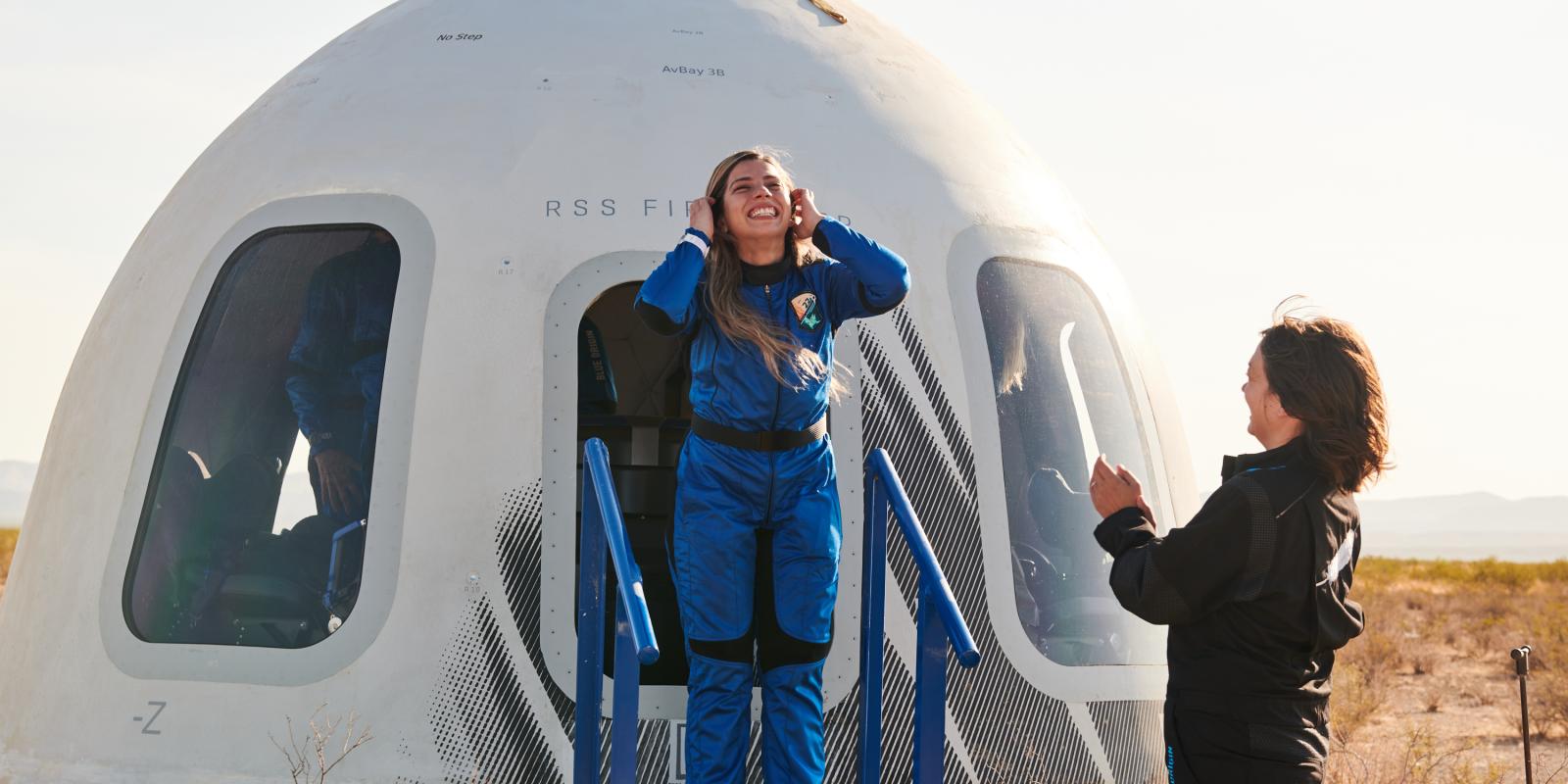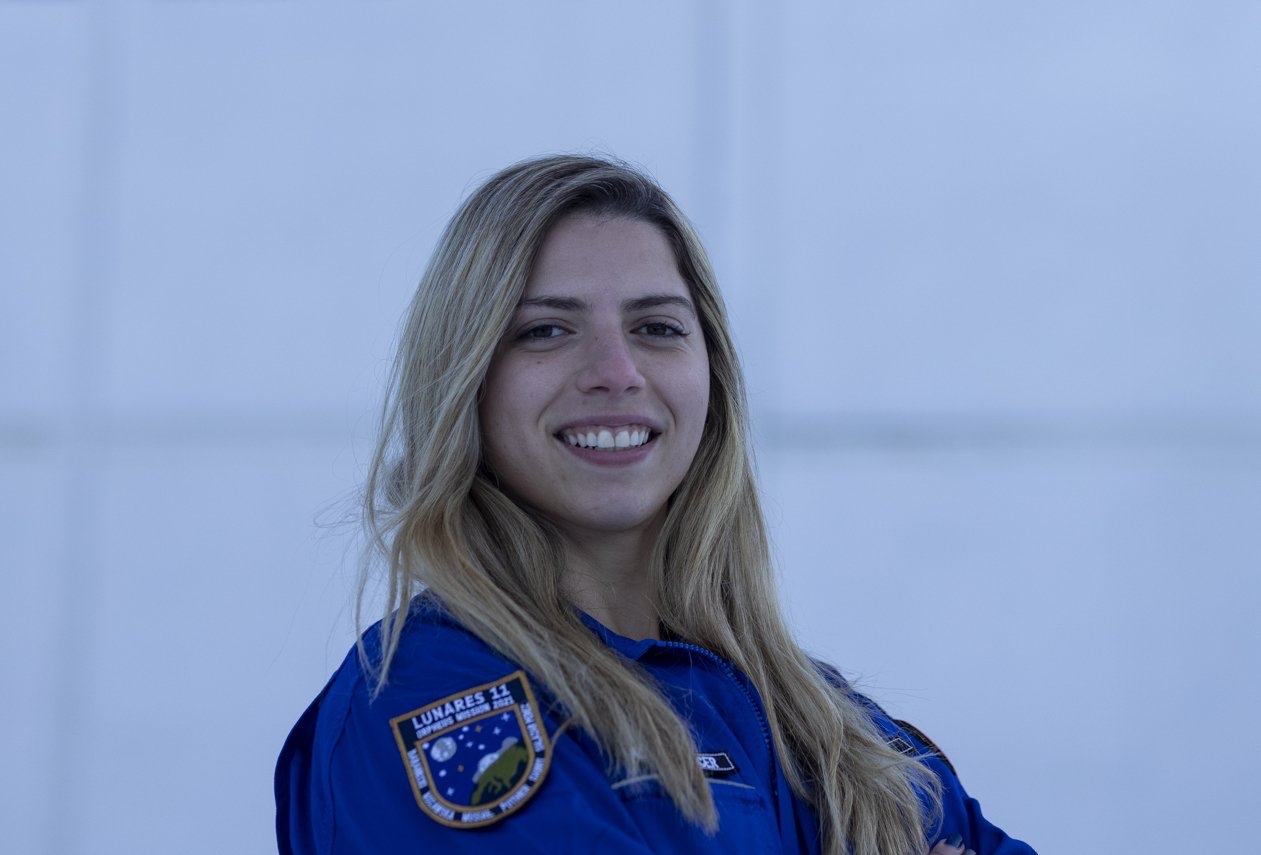
Alumna Astronaut Sara Sabry Becomes First Egyptian to Reach Space
T-Minus 3…2…1… Prepare for liftoff with Sara Sabry ‘16, who became the first Egyptian Astronaut after flying to space on Blue Origin’s New Shepard rocket in August this year. This historical flight also makes her the first Arab woman and first African woman to launch into the obsidian sky, despite having not reached her 30th birthday.

Photo courtesy of Blue Origin Media
Sabry’s trip to the stars allowed her to experience the “Overview Effect,” which is a shift in perspective that happens to astronauts when they leave the Earth and are able to see the planet from afar. “Seeing Earth from space was the most profound experience of my life,” Sabry recalls, describing the planet standing out brightly against the “vast darkness of space.” She continued: “I had seen pictures of Earth from space before, but seeing it in person was completely different. It totally changed how I view the world, my priorities, and most of all, the scale of everything.”
Up Up and Away
As Sabry saw Earth floating in the vastness of space for the first time, she recalls feeling confused. “I think the human brain struggles to process such a view in real life - and if you think about it, it makes sense because we have not biologically evolved to see it with our own eyes,” she said.
When asked about pre-takeoff nerves, Sabry responded, “To be honest, I wasn’t afraid when I was in my seat at takeoff. Sitting on top of a rocket for the first time, I felt excited, ready, and calm. Preparation is key, but in the back of my mind, I also felt like all of Egypt was coming with me.”
Sabry says the experience made her realize that the idea that there is “Earth” as a separate entity from “space” is flawed. “As you lift off, there’s a reflection of fire on the window, you feel the rocket move beneath you, you watch the sky turn from blue to purple to black and suddenly, you’re in space,” Sabry states. “But you didn't really leave anything. Space and Earth, it’s all interconnected.”
Her goal is to extend this opportunity to as many people as possible. “How am I one of only 621 people from all of humanity to have seen this?” Sabry said, describing her emotions upon returning to Earth. “The first thing I said when I came back to Earth was that everyone has to experience this — the universe belongs to all of us.”
Preparing to Launch
With a bachelor’s from AUC in mechanical engineering and a master’s in biomedical engineering from Politecnico di Milano, Sabry was selected among 7000 applicants from all over the world for the citizen astronaut program by Space for Humanity, an organization which offers spaceflights to expand the horizons of leaders who show potential for enacting global change. The program trained Sabry for the experience, highlighting the potential physical dangers and psychological stressors.
“They trained me mentally for this. I knew it wasn’t without risk; sitting on a rocket is inherently dangerous, so the crew members and I needed to accept any and all potential outcomes,” she explains.
Sabry’s training as an astronaut began long before Space for Humanity, however. In 2021 she became Egypt’s first female analog astronaut after a two-week moon mission simulation. She has also completed the IIAS astronaut training program at FloridaTech, making her the first Egyptian woman qualified to conduct research in suborbital space. Initially finding it difficult to get her foot in the door of the space world, Sabry clocked in several hours before and after her full-time job in Berlin to pursue her dream. “I would wake up at 4 am, get my workout done by 5:30 am, work on my bioastronautics research from 6 am to 9 am and then go to work. At 6 pm, I would have dinner and then quickly jump on international calls for a couple of hours before heading to bed at 8 pm. This lifestyle is not for everyone, but it was necessary. Founding a company while holding a full-time job is not easy, but if you believe in the cause, anything is possible.”
Wanting to remove the barriers that she herself experienced, Sabry founded Deep Space Initiative, a non-profit company that aims to increase accessibility in the space field by providing opportunities in research and education.
In addition to being an astronaut, engineer, CEO and founder, Sabry is currently conducting her PhD research on planetary spacesuits at the University of North Dakota and is co-founder of The Egyptian Space Agency's Ambassador program. Since coming back from space, Sabry has also been working on projects that could potentially have large scale impact in Egypt, which she will be announcing soon.
Glowing with passion for paving the way for future space explorers, she said: “It’s not about being the first one in space, it’s about opening the door for others to follow,” Sabry explains. “We need more people with different perspectives, training and backgrounds to work on the issues that are stopping us from becoming a multi-planetary species. That’s why I’m committed to making this field more accessible. I hope people can finally see themselves represented in space, and know that no matter where they are from, they belong here too.”
